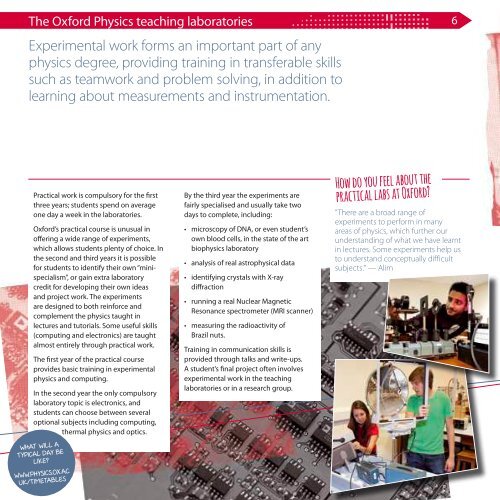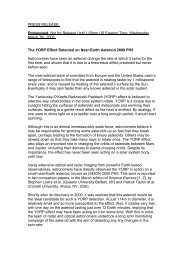to download our brochure - University of Oxford Department of Physics
to download our brochure - University of Oxford Department of Physics
to download our brochure - University of Oxford Department of Physics
You also want an ePaper? Increase the reach of your titles
YUMPU automatically turns print PDFs into web optimized ePapers that Google loves.
The <strong>Oxford</strong> <strong>Physics</strong> teaching labora<strong>to</strong>ries<br />
Experimental work forms an important part <strong>of</strong> any<br />
physics degree, providing training in transferable skills<br />
such as teamwork and problem solving, in addition <strong>to</strong><br />
learning about measurements and instrumentation.<br />
6 Optional units and exams<br />
The physics undergraduate degrees at <strong>Oxford</strong> <strong>of</strong>fer<br />
students a significant amount <strong>of</strong> choice through short<br />
option c<strong>our</strong>ses, labora<strong>to</strong>ry experiments and two major<br />
options in the f<strong>our</strong>th year <strong>of</strong> the MPhys.<br />
7<br />
Practical work is compulsory for the first<br />
three years; students spend on average<br />
one day a week in the labora<strong>to</strong>ries.<br />
<strong>Oxford</strong>’s practical c<strong>our</strong>se is unusual in<br />
<strong>of</strong>fering a wide range <strong>of</strong> experiments,<br />
which allows students plenty <strong>of</strong> choice. In<br />
the second and third years it is possible<br />
for students <strong>to</strong> identify their own “minispecialism”,<br />
or gain extra labora<strong>to</strong>ry<br />
credit for developing their own ideas<br />
and project work. The experiments<br />
are designed <strong>to</strong> both reinforce and<br />
complement the physics taught in<br />
lectures and tu<strong>to</strong>rials. Some useful skills<br />
(computing and electronics) are taught<br />
almost entirely through practical work.<br />
The first year <strong>of</strong> the practical c<strong>our</strong>se<br />
provides basic training in experimental<br />
physics and computing.<br />
In the second year the only compulsory<br />
labora<strong>to</strong>ry <strong>to</strong>pic is electronics, and<br />
students can choose between several<br />
optional subjects including computing,<br />
thermal physics and optics.<br />
WHAT WILL A<br />
TYPICAL DAY BE<br />
LIKE<br />
WWW.PHYSICS.OX.AC.<br />
UK/TIMETABLES<br />
By the third year the experiments are<br />
fairly specialised and usually take two<br />
days <strong>to</strong> complete, including:<br />
• microscopy <strong>of</strong> DNA, or even student’s<br />
own blood cells, in the state <strong>of</strong> the art<br />
biophysics labora<strong>to</strong>ry<br />
• analysis <strong>of</strong> real astrophysical data<br />
• identifying crystals with X-ray<br />
diffraction<br />
• running a real Nuclear Magnetic<br />
Resonance spectrometer (MRI scanner)<br />
• measuring the radioactivity <strong>of</strong><br />
Brazil nuts.<br />
Training in communication skills is<br />
provided through talks and write-ups.<br />
A student’s final project <strong>of</strong>ten involves<br />
experimental work in the teaching<br />
labora<strong>to</strong>ries or in a research group.<br />
How do you feel about the<br />
practical labs at <strong>Oxford</strong><br />
“There are a broad range <strong>of</strong><br />
experiments <strong>to</strong> perform in many<br />
areas <strong>of</strong> physics, which further <strong>our</strong><br />
understanding <strong>of</strong> what we have learnt<br />
in lectures. Some experiments help us<br />
<strong>to</strong> understand conceptually difficult<br />
subjects.” — Alim<br />
Short option c<strong>our</strong>ses allow students<br />
<strong>to</strong> experiment with new material. All<br />
students have the opportunity <strong>to</strong> either<br />
acquire expertise in a more specialised<br />
area <strong>of</strong> physics or <strong>to</strong> broaden their<br />
education by studying subjects outside<br />
the mainstream c<strong>our</strong>se, <strong>of</strong>fered by<br />
another department or faculty.<br />
A sample <strong>of</strong> short optional c<strong>our</strong>ses is<br />
presented here. For more information<br />
about major option choices see page f<strong>our</strong>,<br />
and for labora<strong>to</strong>ry choices see page six.<br />
“In addition <strong>to</strong> the unprecedented<br />
levels <strong>of</strong> personal contact with tu<strong>to</strong>rs,<br />
the flexibility <strong>of</strong> the system is incredible.<br />
In my first year, I had one-<strong>to</strong>-one<br />
tu<strong>to</strong>rials with one <strong>of</strong> the most brilliant<br />
physicists I have had the chance <strong>to</strong><br />
know, we would spend five minutes on<br />
my work, and the rest would be spent<br />
teaching me amazing stuff outside the<br />
syllabus! Where else if not <strong>Oxford</strong>!”<br />
— Stanislav<br />
COURSE TITLE<br />
• Astrophysics: from Planets <strong>to</strong> the<br />
Cosmos<br />
• Introduction <strong>to</strong> Biological <strong>Physics</strong><br />
• Classical Mechanics<br />
• <strong>Physics</strong> <strong>of</strong> Climate Change<br />
• Energy Studies<br />
• Financial <strong>Physics</strong><br />
• Functions <strong>of</strong> a Complex Variable<br />
• Particle Accelera<strong>to</strong>r Science<br />
• Plasma <strong>Physics</strong><br />
• Quantum Ideas<br />
• Advanced Quantum Mechanics<br />
• Stars and Galaxies<br />
From other departments or faculties<br />
• His<strong>to</strong>ry <strong>of</strong> Science<br />
• Language Option (French, Spanish or<br />
German)<br />
• Philosophy <strong>of</strong> Quantum Mechanics<br />
• Philosophy <strong>of</strong> Science<br />
• Philosophy <strong>of</strong> Space-Time<br />
• Teaching and Learning <strong>Physics</strong> in<br />
Schools<br />
EXAMINATIONS<br />
Students take a set <strong>of</strong> written<br />
examinations at the end <strong>of</strong> each year<br />
and must show a satisfac<strong>to</strong>ry record <strong>of</strong><br />
practical or project work. The BA <strong>Physics</strong><br />
degree classification is made from the<br />
combined results <strong>of</strong> the second and third<br />
years as well as project work. The MPhys<br />
degree classification is made from the<br />
combined results <strong>of</strong> the second, third and<br />
f<strong>our</strong>th year examinations and the project<br />
report. There is a minimum required<br />
standard <strong>of</strong> a 2:1 in the second year<br />
exams for continuation on<strong>to</strong> the MPhys<br />
degree.<br />
MEET STAN AND<br />
How do you feel about the<br />
tu<strong>to</strong>rials at <strong>Oxford</strong><br />
OTHER PHYSICS<br />
STUDENTS!<br />
WWW.PHYSICS.OX.AC.<br />
UK/PROFILES




